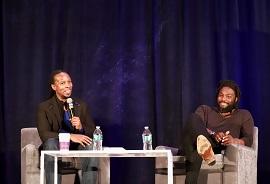 At a keynote session at Winter Institute 15 last month in Baltimore, Md., author Jason Reynolds and historian Ibram X. Kendi discussed their upcoming book Stamped: Racism, Antiracism, and You. Due out from Little, Brown Books for Young Readers in March, Stamped is a remix for YA readers of Kendi's 2016 book Stamped from the Beginning: The Definitive History of Racist Ideas in America.
At a keynote session at Winter Institute 15 last month in Baltimore, Md., author Jason Reynolds and historian Ibram X. Kendi discussed their upcoming book Stamped: Racism, Antiracism, and You. Due out from Little, Brown Books for Young Readers in March, Stamped is a remix for YA readers of Kendi's 2016 book Stamped from the Beginning: The Definitive History of Racist Ideas in America.
Kendi began the discussion by talking a little bit about Stamped from the Beginning (which he and Reynolds then called Stamped Sr. for the rest of the session) and how the YA remix came to be. Stamped from the Beginning, he said, examines the history of racist ideas from the mid-15th century to the present, tracing two broad categories of racist ideas that he terms segregationist and assimilationist. At the same time, he shows the evolution of opposing ideas, which he calls antiracist, and argues throughout the book that racist ideas didn't lead to racist policies, but racist policies actually led to racist ideas as people sought to rationalize the systems and institutions that unfairly benefited them.
 |
|
|
Ibram X. Kendi (l.) and Jason Reynolds |
|
Kendi recalled that after Stamped Sr. was published, he had plenty of conversations with readers who couldn't believe they were only now learning about these things at the age of 40 or 50, or who said they wanted "all American kids to know this story." Kendi saw the value of a YA version, but felt he couldn't do it himself. Once he met Reynolds and got to know his work, he "quickly realized he would be perfect to literally remix this text for young people." But the first time he asked Reynolds to take on the project, and the next several times, Reynolds said no.
"I was saying no with humility," explained Reynolds, because he didn't see himself as a scholar or researcher or academic. He called Stamped Kendi's "life's work," and said if Kendi was looking for a "new tuning fork" to bring the conversation to a new audience, he didn't "want to be the person to knock the key off." But eventually he said yes, partly because Kendi was "awfully persistent," and partly because a person's fear and intimidation is ultimately "small and short-sighted" when "thinking about the impact a thing might have." And while he isn't an academic, he does know how to connect to kids, and decided that if Stamped Jr. was going to happen, he'd be the one to "swing the bat."
On the subject of how Reynolds went about making a very academic history of ideas accessible for a younger audience, he joked that "we're gonna see how accessible it is in a few weeks," but went on to compare the process with an exercise he does in classrooms in which students translate something like one of Shakespeare's sonnets first into American Standard English and then into "the English or other language of their neighborhoods." He used the same sort of exercise to take this academic text and "translate it so that it feels super familiar," like something "you already know but didn't know you know."
Kendi anticipates that some historians will take issue with the way Stamped is being framed as not a history book, but said he doesn't care because the best history books are rooted in the present and allow readers to apply the past discussed in the book to the present. Reynolds agreed, saying that to read history and study history without being able to use it was a "waste of resources," and hopes that the language of antiracism found in the book will give young people a "sword and shield," not so they can "cut anybody down" but to be informed and to protect themselves.
They discussed the possibility that there may be parents or teachers concerned about giving the book to kids and teens because they view discussions of race and racism as things they should protect their children from. Kendi proposed it was quite the opposite. Learning about these things at a young age, he said, can free children of any ethnicity from being manipulated by racist ideas. A child who is a member of a group that has more, he continued, won't grow up thinking that they are more, and a child from a group who has less won't think that they are less.
"What an amazing thing it would be," Reynolds remarked, if more children started to see that "there is a lot wrong with America," but there's "nothing wrong with Black people." --Alex Mutter

